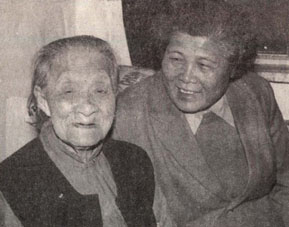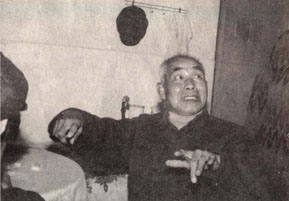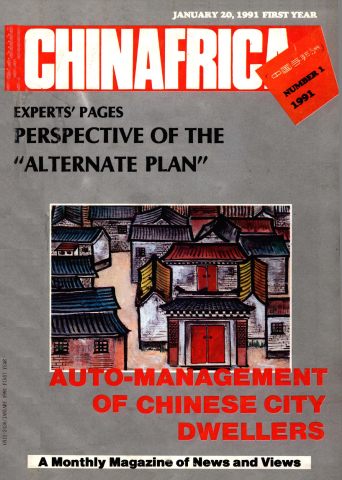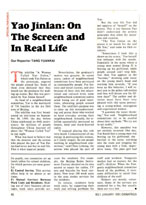The telefilm “A Woman Called Yao Jinlan,”which took Yao Jinlan as- the prototype, angered the people around her. Some of them even declared that they would sue the producer for making up stories. But this was prevented by Yao Jinian herself.
As head of a neighbourhood committee, Yao is the matriarch of 734 families in the An Deli area of Beijing.
The telefilm was first broadcasted on television on September 30, 1989, the day before China celebrated its 40th anniversary. So millions of people throughout China learned all about the “Woman Called Yao”in one night.
What was hard to believe was that the director and the actress who played the part of Yao Jinlan had never met her in real life. This is what angered people.
Nevertheless, the producer’s motive was genuine. In recent years, cadres of neighbourhood committees have been portrayed as contemptible people. For historic and social reasons, and also because of their own low educational and cultural level, some neighbourhood committee cadres acted wrong out of good intentions, alienating people around them. The telefilm’s purpose was to clear up this misunderstanding and praise those who worked so hard everyday serving their neighbourhood. Actually, the telefilm successfully portrayed an honest, kind and warm-hearted cadre.
“I enjoyed playing this role very much. I concentrated all my energy in portraying this woman,as 1 really respect the old people working in neighbourhood committees,” said Chen Lizhong, the actress who played the part of Yao.
But the true life Yao did not approve of “herself” on the screen. This is not because Yao didn’t understand the artistic principles that allow for invention and creation.
“The Yao Jinlan on the screen is no match for the real life Yao,” said some An Deli residents.
“Sometimes I look like a shrew on the screen.” Yao herself was unhappy with the results. Especially in the scene where a young man named Qiang Zi is beating up his girlfriend, while people around can’t stop him. Just then Yao appears as the “heroine,” throwing cold water on the young man’s head and warning him severely, “If you keep up this behavior, 1 will report you to the police sub-station and they will detain you for fifteen days!” The author and director must have been very pleased with this scene portraying a strong-willed, courageous and experienced woman.
“I question the water throwing,” Yao said. Neighbourhood committees try to be careful about their methods. “We try not to act rashly.”
However, this anecdote was not entirely invented. One day, Yao heard that a young man was beating up his girlfriend; she hurried to the scene, storming into the room and stopping the young man with a firm, imperative voice. The poor girl had blood dripping all over her face. After successfully calming the young couple, Yao asked them the cause of their fight, analysed it from a legal and moral point of view, pointing out what was right and wrong. At last the young couple understood their faults and made up.
Yao was once praised by the municipal government for preventing a fight between two drunkards armed with knives.
Now 61 years old, Yao became head of the neighbourhood committee in 1982. Before that, she had worked in a smeltery in Beijing. She officially retired in1979, but kept on working in the factory until 1982, earning much more than with the neighbourhood committee.
“Residents here needed me, so I undertook the job with pleasure.” Yao said.
When she took up the post eight years ago the organization was in a shambles. Moved in 1949 to the An Deli Area from Hebei Province, Yao remembers that there were grave mounds and manure pits all around the area. After the liberation, many houses were built and many people, moved in the area, but the environment did not improve. Many inhabitants were poorly educated, often fought with each other, and quite a few lived from what they could find in local garbages.
“Everything was dirty and disorganized back then.” Yao told us, “There wasn’t even a tree around.” The first thing she did was clean up the place and plant trees.
Rubbish could be seen everywhere. “We only had our two hands,” and many people were lazy and did not co-operate. Yao, along with other cadres of the neighbourhood committee and members of her family, had to show the example and start the work. At the same time, she never gave up persuading other people to join them. Gradually, more and more were moved by their actions and volunteered their help, improving the environment daily.
Many people here once sought a livelihood by collecting garbage. Though this is no longer the case and no one lacks food or clothing, many still have the habit of picking through the garbage. Yao went to these families again and again to persuade them to give up this habit. This displeased many people. “I will do anything I like, mind your own business,” some said to her.
As head of the neighbourhood committee, Yao was also frustrated because she did not have the administrative, economic and legal powers to help her. But eventually, her wisdom and kindness succeeded and the district gradually became cleaner and greener.
She invited teachers to help out the poorly educated people—even holding a cooking class—to develop their skills and enrich their cultural life.
From the day Yao became head of the neighbourhood committee, she has never stopped. She got so tired that she developed heart problems and had to send her weak and ill husband to the old-age care centre.
The old-age care centre is one of Yao’s inventions. As the name implies, an old-age care centre is quite similar to a child-care centre. One day, Yao noticed an old man sitting on the balcony for several hours. Intrigued, she looked into the matter and found out that many old people felt lonely when their children went out to work. She then came up with the idea of an old-age care centre. If their children went on a business trip, or could not care for their parents for some time, elderlies could go to the old-age care centre where they needed not worry about food, lodging and entertainment.
“I get along well with my children, but I am not willing to bother them all the time, so I usually live here, said a grandfather named An. In fact, his home is not in the An Deli Area, but far away and it takes him over an hour by bus to come to the old-age care centre. “It’s like home to me,” said yet another 92-year-old grandmother.
Yao also runs a nursery for infants, eliminating many problems for young parents.
Both the old-age care centre and the nursery belong to the “Community Service Centre,” which was initiated by Yao Jinlan. Besides these two, services offered by the Community Service Centre include a laundry, a cafeteria providing lunch for school children, a matchmaking agency for middle-aged and elderlies, an entertainment centre, etc.
Yao spent all her energy setting up this service centre. The main problem she met was the shortage of funds. At the beginning, Yao and the residents built a three-bay house with old bricks. But this did not satisfy the needs of the people. Yao wanted a multi-storey building, but 400,000 yuan were needed. So she and others in the neighbourhood committee went out on a fund-raising campaign. Their honesty moved factories and organizations to finance them and at last the building for the service centre was erected.
Services were rendered for a very low fee. “We have to do so to obtain the necessary funds to run all our services,” Yao explained, “but we will, not spend a penny without a good reason. We follow the principle 'Get money from the people and use it for the people’ to help the inhabitants deal with their difficulties.”
“Solving people’s real problems” is Yao’s motto. She has never spent time imagining ways to get praised, and considers herself a civil servant, not the “matriarch” of An Deli.
“Though, in a way, I am the matriarch, because I have to pay attention to each and every member of a big family, including young people who have committed crimes,” Yao said. She never gets tired with them, giving them moral instructions and reaching for their feelings. She encourages them to believe they still have a future in spite of their crimes. In recent years, Yao has bailed out several young people and treated them like her own children. She became the first person in Beijing to reach an agreement with a prison, in the name of her neighbourhood committee, allowing her to help a young girl sentenced for embezzlement.
Yao’s only regret was that she did little for her children and grandchildren. “I could have stayed home and taken care of my grandchildren. Now, like me, many old people in the neighbourhood committee pay for baby-sitters,” Yao said, “but our children support us.”
What disturbed Yao most is that “Yao Jinlan” on the screen could not find a way to solve her family problems. The telefilm’s plot had Yao’s daughter-in-law fall in love with another young man and divorce Yao’s son. Yet, Yao’s son quite understood his wife and befriended the man who “robbed” him of his wife. We should say this anecdotal makeup is unfair to Yao, though such things may have happened in the families of other neighbourhood committees, but they were not called “Yao Jinlan.” Yao told me that this brought her a lot of trouble and since the broadcast she has received many letters from her relatives asking her which son of hers divorced (Yao has four sons and two daughters).
Maybe Yao herself has never realized that the words “love, creation, responsibility and devotion,” which are so frequently used in conversations, could mean so much to a community. But with her actions, Yao has turned the four words into reality, gaining the respect and understanding of many people.
“I should have lived with Yao for a period of time, but the producer asked us to finish the film within a month. So I had nochance to get to know Yao Jinlan in real life. It’s a real pity,” said Chen Lizhong, the actress interpreting Yao in the telefilm.
It was really regretful. Otherwise, “Yao” on the screen would surely have been more faithful to reality, or would have taken on a different name.

An elderly lady expressing her thanks to Yao Jinlan (right). TANG YUANKAl

A retired worker recalling stories from his neighbourhood. TANG YUANKAI


 Copy Reference
Copy Reference 